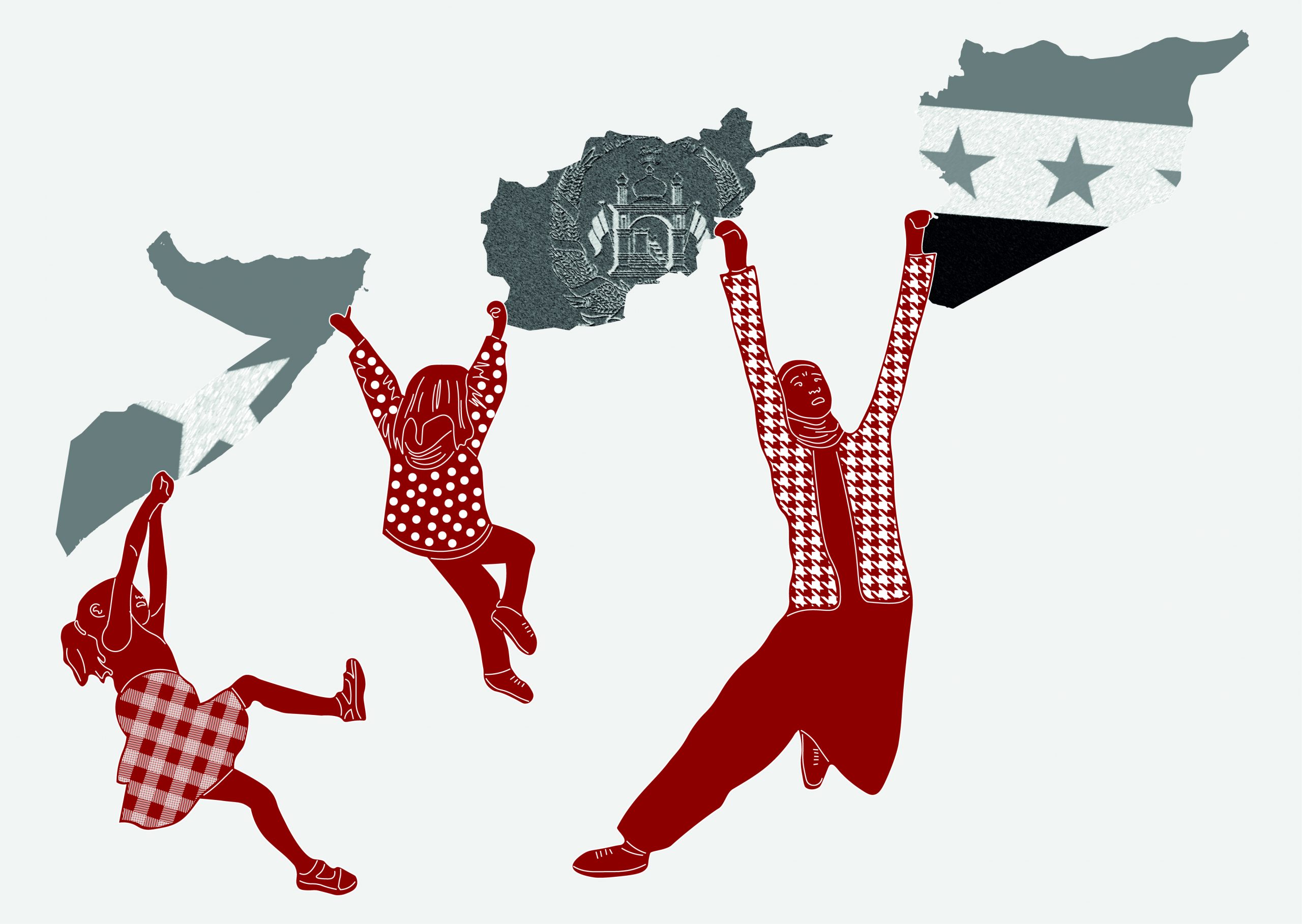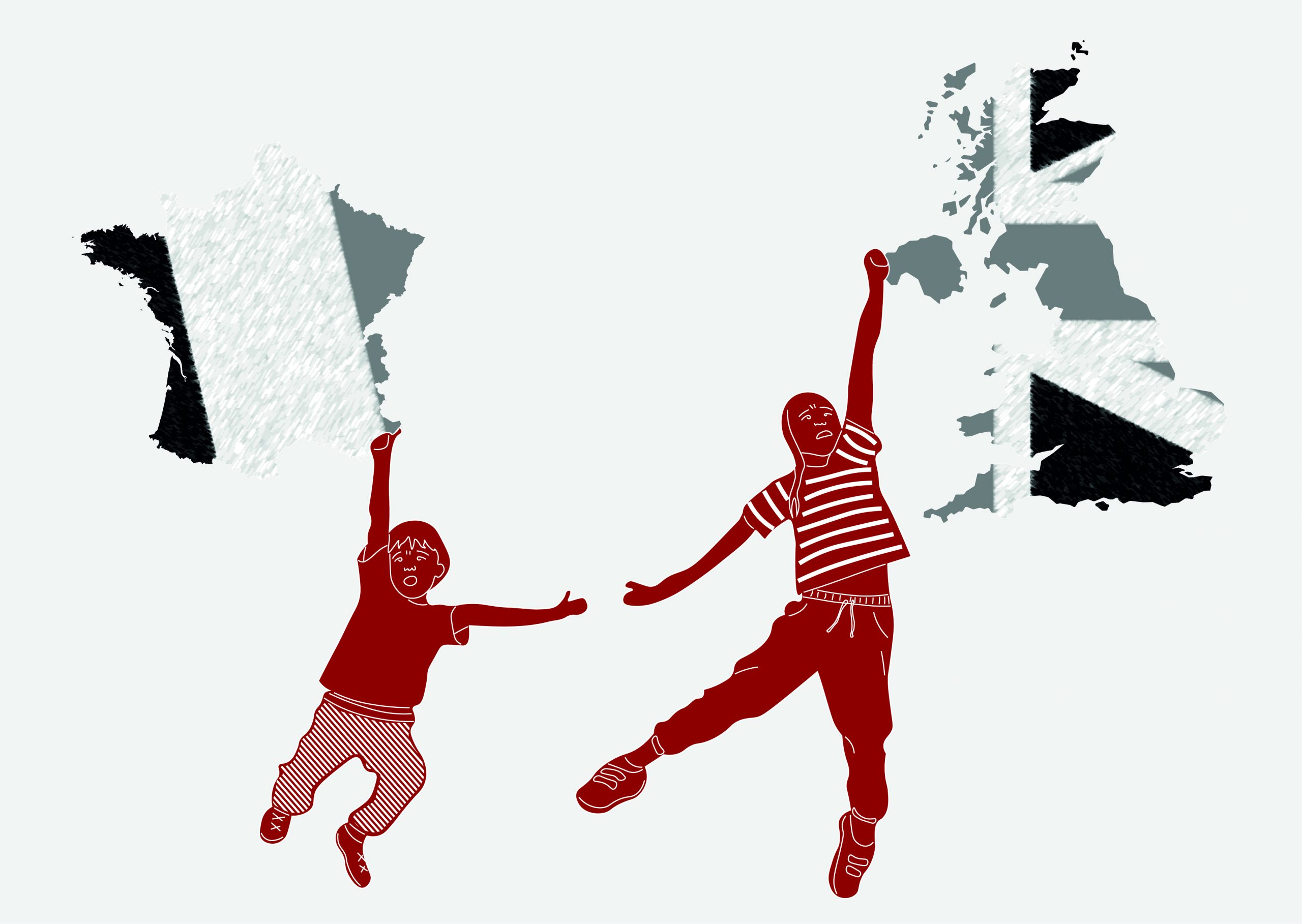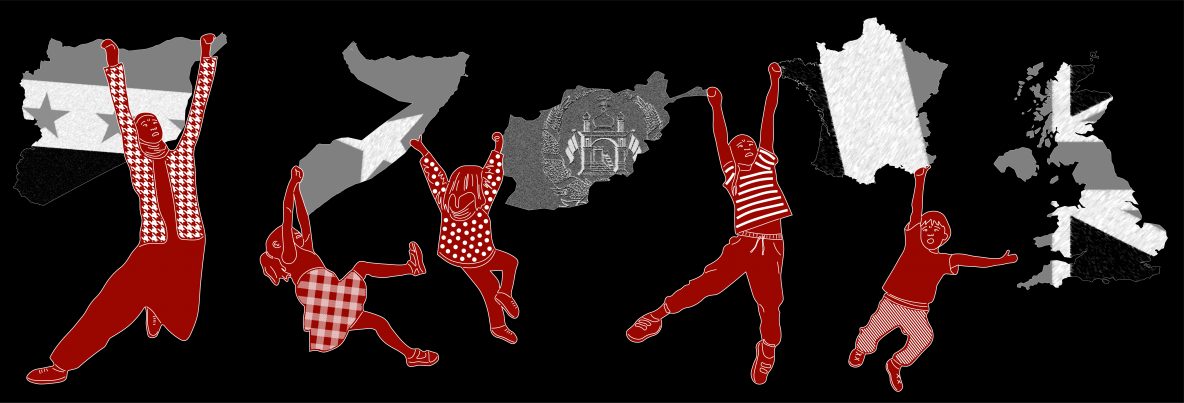Border Stories
Why are we ignoring the refugee crisis on our doorstep?
By Jemima Compton / 7 July 2020

Illustration by Juliet Welshman
Calais is a border I’ve frequently crossed, having lived between the UK and Brussels all my life. I’d sometimes see refugees walking in the middle of dual carriageways or distant clusters of tents out my window on the A16. I knew little about the truth of those people’s lives and thought little about how lucky I am to be able to hop on the Eurotunnel and get to and from the UK within 30 minutes to visit family and friends on either side of the channel.
I write lying in bed under the roof window of my modest Airbnb as the rain pours in Calais. I’ve come here as I felt the refugee crisis is something I should physically pay attention to instead of simply feeling aggravated when reading the news. Listening to the rain pelting down is a feeling I’d usually cherish, being cosy indoors as a wild storm brews beyond, but not tonight. I’d spent the day distributing t-shirts to refugees because it’s summer. Although grateful, our customers asked, ‘no coats?’ whilst looking warily at darkening clouds. I don’t sleep as I think about the friends I’d made sleeping in cramped and sodden tents, or, worse, without tents or sleeping bags at all on the puddled forest floor – a forest they know as the ‘jungle’.
The term ‘jungle’ was coined by refugees and derives from the Pashto word ‘dzjangal’ which means forest or wood. However, it’s a name I struggle with as tabloids delight in using it to alienate and bestialise migrants In reality, their camps are as civilised as they can make them, with living areas created with wall hangings, swings made for children to play on and suspended trollies to keep their food away from rats. The issue is that before they are able to make their area as homely as possible, the police come to evict them with threats of tear gas.
What speaking to the refugees has highlighted amidst the #defundthepolice campaign is that police brutality is prevalent within refugee communities and it’s something they experience as soon as they first set foot in Europe. Earlier this month Amnesty International reported how migrants in Croatia were ‘brutally beaten and tortured by officers who mocked their injuries and smeared food on their bleeding heads to humiliate them’. Romanian police are also notorious for stripping refugees from everything they own: clothes, medication, money, and their dignity as police beat them, including middle-aged mothers, with batons and even with their own belongings. Beyond Romania and Croatia, tear gas, police evictions and racism are still prevalent wherever they go. When one of the volunteers spoke to a refugee about what they needed most in Calais, it wasn’t food or clothes, but protection from the police she asked for.
‘England’ is a word that echoes across the different camps we visit – many of the occupants base their understanding of UK geography on football, and we hear of hopes to make a life in London, Birmingham, Manchester. The tabloids fail to mention that thousands of refugees seek asylum in European countries such as France, Germany or Italy with only a small percentage coming to Calais to reach the UK. This desperation to reach a country where they can speak the language or have family makes this life-threatening journey necessary.
People here have led tougher lives than I could ever imagine.
One 17-year-old I spoke to had walked to Calais from Afghanistan alone after the cousin he was with died in a lorry accident. He’s incredibly well-spoken and shows me his new grey hairs, which he’s accumulated from the stress of his journey. He’s so close to his destination to meet his uncles in south London but is repeatedly left ‘heartbroken’ when he is sent away from the border. He has dreams to study maths at university and to play cricket again, and we laugh at how Afghanistan has a far better cricket team than France as the gendarmerie look over us.
On another day, we gather in a peaceful grassy park where Pakistanis come for some tea and a chat. One man I speak to reminds me of my neighbours when I lived in a Pakistani populated area of Leeds, with his northern English accent and blazer. He had been living in Blackpool and left England to visit his family: little did he know, he wouldn’t be let back in. With all his belongings and his family still in the same house he left them in, he’s been trying for 4 years to get back with no luck. It's also been 4 years since the EU referendum. Although this man is not a European refugee, this specific story ties into more general attitudes. The hostile atmosphere that Brexit has engendered towards immigration and refugees is undeniable.
Being here has highlighted the privilege afforded to me because of my westernism and my dual citizenship, which allows me to cross with ease a border that for others represents danger, violence and the risk of death. I have choices, opportunities and freedom that refugees deserve more than I do, coming from countries where politics is a minefield, and neither human rights nor safety is a guarantee. A refugee I speak to wears a t-shirt saying ‘I am a human being’. Although the charity can’t give them protection from police, we can treat them as humans ourselves which shouldn’t be something they should have to ask for nor prove by wearing a t-shirt.

Coronavirus has meant that donations and volunteers are low at refugee charities. Care 4 Calais has been the only charity that continued to operate through lockdown and they desperately needs tents first and foremost – these are usually donated after festivals, but seeing as they’re all cancelled this year the tent supply is low.
Otherwise clothes with no stains or holes, unused toiletries and food can be donated at UK pick up points:
You can also find a list of items they are in need of here: https://care4calais.org/documents/Priority-Items.pdf?fbclid=IwAR2yuqCw_qtJ30kfMlpa1fSrNd_t9SEqdJ6-PTUHeyMpena4L__YyGx9oMk
And you can make a financial donation here: https://care4calais.org/donate-now/
Art by
Words by
Share this article

